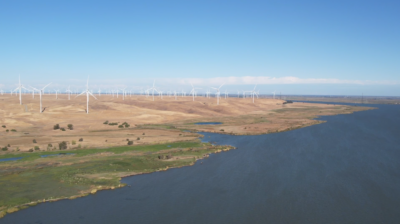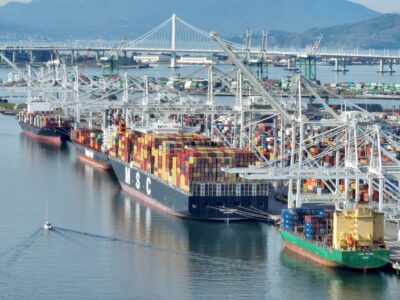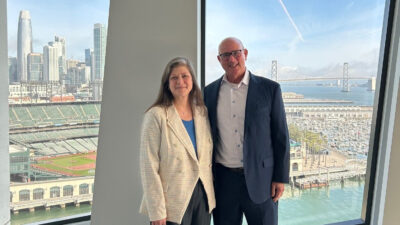California Resilience Challenge Announces Statewide Request for Proposals for Climate Adaptation Projects
The Bay Area Council Foundation today launched the official request for proposals for the California Resilience Challenge 2021 Grant Program, a statewide competition to support innovative projects that address climate change-related threats and help safeguard under-resourced communities against wildfire, drought, flood and extreme heat events. Recipients will receive grant awards of up to $200,000 to advance climate adaptation planning projects.
The California Resilience Challenge 2021 Grant Program will provide resources to local communities throughout the state, including community-based organizations, cities, counties, California Native American tribes, special districts, and other local and regional jurisdictions representing under-resourced communities. By emphasizing local solutions to the global problem of climate change, communities can create scalable plans and infrastructure to meet their immediate and long-term climate adaptation needs.
“California has smashed nearly every climate-related record over the past decade” said Jim Wunderman, President and CEO of the Bay Area Council. “Reducing our emissions isn’t enough. We must strengthen the resilience of communities across California, beginning with our most under-resourced. We’re grateful for the leadership and support of so many partners in making the California Resilience Challenge 2021 Grant Program happen, and we’re excited to see what creative, resourceful and cutting-edge projects emerge from this unique competition.”
The launch comes as California struggles to adapt to increasingly severe climate events. Multiple hot and dry winters have severely limited California’s snowpack, leading to dangerously low reservoirs and a statewide drought emergency; dry weather has increased the risk of catastrophic wildfires, leading to a record 4 million acres burned in 2020; August 2020 was the hottest month in state history; the winter of 2017-2018 was the wettest year on record for Northern California; and sea levels at the Golden Gate Bridge are projected to rise more than one foot by 2050.
Climate change is costly, wiping out investments, assets, and damaging livelihoods. California’s Fourth Climate Change Assessment found that rising temperatures could cause up to 11,300 more heat-related deaths annually across California and cost the state up to $50 billion a year by midcentury.
Last year, the California Resilience Challenge funded 12 projects in each census region of the state. Winning proposals addressed issues of extreme heat, wildfire, drought, and flooding and were chosen for their geographic diversity, support for disadvantaged communities, and replicability. From drought resilience in the Central Valley, to heat resilience in Southern California, to wildfire preparedness in California’s forests, these projects showcase some of the world’s most innovative thinking on climate resilience.
The California Resilience Challenge is an initiative of the Bay Area Council Foundation, and is supported by a diverse group of stakeholders, including businesses, utilities, nonprofits, and philanthropies who all contributed resources to establish the initiative. The California Resilience Challenge 2021 Steering Committee includes representatives from JPMorgan Chase, PG&E, Resources Legacy Fund, Southern California Edison, and Valley Water.
Additional sponsors include Wareham Development Group, CSAA Insurance. The RFP was developed in partnership with companies and non-profits serving on the Resilience Challenge Advisory Committee, including AECOM, Ceres, Climate Resolve, Environmental Defense Fund, The Greenlining Institute, Guidiville Rancheria, Muwekma Ohlone Tribe, NAACP California/Hawaii, The Nature Conversancy, Pillsbury Winthrop Shaw Pittman LLP, The Solutions Project, and Urban Habitat.
What Leaders Are Saying
“Climate change continues to impact local communities where we live and work, and effective solutions require ongoing commitment to resilience efforts like the California Resilience Challenge,” said Allen Fernandez Smith, Head of Philanthropy for the West Region at JPMorgan Chase. “Collaboration with industry stakeholders and community partners is key to identify innovative solutions that address the serious effects of excessive heat waves, droughts, floods and other climate-related and natural disasters, and we’re proud to work with the Bay Area Council and local leaders.”
“Climate change increasingly affects all of the communities Southern California Edison serves, with more frequent and severe weather,” said Andrew Baldonado, the company’s vice president of state public affairs. “We support the California Resilience Challenge because it helps local governments, tribes and community-based organizations prepare for and respond to extreme weather events, while building community resilience.”
“The California Resilience Challenge is an important opportunity for California leaders to invest in community resilience,” said Matthew Armsby, Vice President for Policy at Resources Legacy Fund. “We look forward to seeing proposals for creative and collaborative projects that help all Californians, particularly our most vulnerable communities, address growing threats from fire, drought, heat, and flooding.”
“It is excellent to see the California Resilience Challenge continue in this fashion,” said Rick L. Callender, Chief Executive Officer of Valley Water. “The discussion surrounding racial equality and inclusion that have dominated the airwaves and dinner tables during the last year makes this kind of effort timely and welcome to ensure that all communities are included in the discussion around environmental justice and climate change. This is truly a step in the right direction.”
“As temperatures soar across the country, we can see that the health impacts of climate change are not a future threat – they are here today, and they disproportionately harm the most vulnerable among us,” said John Vu, vice president for Community Health at Kaiser Permanente. “As a health care organization, we are focused on mitigating the effects of climate change and we are proud to support the California Resilience Challenge to address growing threats to the health of our communities from rising temperatures, fire, drought and flooding.”
“Communities across California face growing risks from a changing climate,” said Chris Benjamin, Director of Corporate Sustainability at PG&E. “As part of our triple bottom line approach to sustainability, PG&E is going beyond managing risk through our operations by investing in new and innovative climate resilience plans. We want to encourage communities throughout California to apply to the Resilience Challenge and help build a more sustainable future.”
“Every region in the state is experiencing more frequent, prolonged, and severe impacts of climate change,” says Nuin-Tara Key, Deputy Director, Climate Resilience at the Governor’s Office of Planning and Research. “The California Resilience Challenge helps fill a critical resource gap by supporting local and regional planning efforts that reduce risk and build resilience, especially for our most vulnerable communities.”
“Business leaders across California have set ambitious goals to reduce pollution and protect their organizations from climate change, because they recognize the enormous economic and human costs of inaction,” said Jennifer Helfrich, Senior Manager of State Policy at the sustainability nonprofit Ceres. “With wildfires, drought, and extreme heat already causing so much damage across the state, the California Resilience Challenge provides a great opportunity to spark and test innovative ideas that will help tackle the climate crisis.”
“Pillsbury is excited to have a front-row seat to the future of climate change resilience in California. We are also happy to partner with the other organizations sponsoring the Challenge, and we look forward to reviewing creative and competitive project proposals that will serve under-resourced communities,” said Stephanie Angkadjaja, Associate at Pillsbury Winthrop Shaw Pittman LLP.
“The climate crisis and inequality can both be traced back to structural racism and for-profit, private ownership models. As we work to address these inequities, we must center the needs and voices of those most impacted – low-income communities of color. The California Resilience Challenge will support disadvantaged communities in planning their response to extreme heat, drought, wildfires and other climate-related consequences while we also work to address the drivers of climate change,” said Ellen Wu, Executive Director at Urban Habitat.
“While Californians recognize the climate crisis underway, it’s past time for industry, philanthropy, and government to invest in solutions advancing from communities leading on climate justice,” said Gloria Walton, President and CEO of The Solutions Project. “Innovations from legacy grassroots organizations all across the state are practical and interconnected, solving many problems at once — from a cleaner and more localized electric grid to solar-powered affordable housing to just transition plans that modernize our infrastructure and make our economy more adaptive to climate change. Frontline communities are leading the way and this is an opportunity for the state to strengthen what’s working.”
“We’re delighted that the California Resilience Challenge is back to champion more innovative resilience projects across the state, and this year community-based organizations can be direct recipients of funding,” said Claire Bonham-Carter, Director of Sustainable Development at AECOM. “The California Resilience Challenge will help progress equitable climate adaptation planning by providing resources to local communities most in need. AECOM is proud to support the Bay Area Council Foundation on this unique and collaborative approach to prioritizing and strengthening resiliency in our state.”
“I’m excited about the amazing opportunities and resources being offered to and for the CBO’s and other organizations,” said Betty Williams, California Hawaii NAACP State Conference Executive Director. “Focusing on the underserved communities to educate environmental justice is fairly new. Our communities have had a limited amount of support and never had the opportunity offered to them to participate.”
“The leadership and membership of the Muwekma Ohlone Tribe of San Francisco Bay Area has a very long history of being concerned about climate change and its adverse effect on the diverse habitats and biotic communities throughout the West,” said Monica V. Arellano, Vice President of the Muwekma Ohlone Tribe. “Our tribe fully endorses and supports the California Resilience Challenge in order to help all of our communities throughout California plan for the future well-being of our citizens, our agricultural enterprises, our sources of freshwater, the air we breathe, health of the Bay, protection of wildlife, fish and birds, and coastal resources that are precious to us all.”
“California Resilience Challenge 2.0 is better than ever,” said Jonathan Parfrey, Executive Director of Climate Resolve. “This year’s key change allows nonprofit organizations, especially justice groups, to apply for funding, moving equity center stage in climate resilience planning and implementation.”
“The Greenlining Institute has centered racial equity for low-income communities of color in our policy and communities of practice work for nearly 30 years. True transformation to fight climate change, build economic prosperity and redress the historical impacts of redlining will come from hyper localized opportunities like the opportunities offered by the California Resilience Challenge. We look forward to engaging communities of color in this worthwhile effort,” said Debi Gore-Mann, President and CEO of the Greenlining Institute.
“The impacts of climate change on human and natural communities in California are far reaching,” said Michelle Passero, Director of Climate Policy at The Nature Conservancy. “The California Resilience Challenge will catalyze both planning and action to build climate resilience across communities where it is most needed. The Nature Conservancy is proud to contribute to this collaborative effort.”
“With California in the second straight year of drought and wildfires and extreme heat battering the entire West, this year should be a blaring wake-up call for a far bolder, more proactive approach to build water resilience to this climate crisis in the West,” said Ann Hayden, Senior Director, Water, at Environmental Defense Fund. “The California Resilience Challenge is a valuable example of the multisector approach that is needed to address the multiple effects of climate change.”
“The California Resilience Challenge is providing an opportunity for not only communities but for California’s first peoples to come together and protect our ancestral lands” said Meyo Marrufo, Tribal Environmental Director and USEPA National Tribal Caucus, California State Representative. “How powerful and needed to continue our seventh generation through climate resiliency.”
“At CSAA Insurance Group, we believe protecting our planet from the threat posed by climate change is an inherent responsibility to our customers, employees, business partners, and the communities we serve, live in and work in,” said Danielle Cagan, VP, Sustainability, CSAA Insurance Group. “Our focus has been, and will continue to be, on keeping our communities safe from wildfires and severe weather related to climate change. As a sponsor of the 2021 California Resilience Challenge, we’re proud to be among those searching for innovative solutions to the climate change crisis.”
Communities in Need
Responses to the RFP are due by 5:00pm, September 13, 2021.
The RFP can be found here.
The California Resilience Challenge will be hosting a webinar on Monday July 19 to discuss the RFP. Interested participants may register here.
California Resilience Challenge Contact
Anna Sciaruto
Senior Policy Associate
Bay Area Council
asciaruto@bayareacouncil.org





